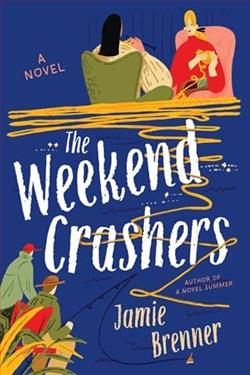Page 21 of Due Diligence
“Go ahead,” I said as I straightened my spine. I shook my hair back, wishing I had a hair tie. Somehow, I was exhausted from having done nothing more than shove this humongous box into the room.
He inhaled through his teeth with his face pulled into a grimace. “Cassie, I completely forgot to mention this. My assistant had a little trouble when he was pulling it out of the closet, so some things might be out of order…”
Something in his expression was far too wry for this admission. In fact, he was practically smirking as he delivered this update. Dread filled me, practically choking me. Hastily, I bent over and pulled the cardboard lid off the box, and at once I realized I’d been played for a damn fool.
Nothing in the box was in order. It was a haphazard pile of papers, laying every which way, some facing in one directionand others upside down. It was chaos condensed, almost like someone removed all the staples and paperclips from the documents, threw them from the third story of the office, and then shoved them carelessly into this box.
“Oh…and now that it’s in the data room, I’m not allowed to come in to fix it and you’re not allowed to take it out, are you?” Marcus pursed his lips. “Shit, this is going to be a huge headache for you, isn’t it?”
Satisfaction tinged every word. It was almost disturbing how much he enjoyed this—almost like he had been planning this one for days.
Bastard. What a sneaky, underhandedbastard.
And I wanted to say that to him. I wanted to shout it in his stupid, smug face. But I remembered what Corinne said: I needed to get it together. My job depended on it. And if I ever wanted to pay my parents back, Ineededthis job.
“I can handle it,” I replied, miraculously keeping my tone calm. “Thanks for carrying this over.”
He lingered in the doorway, clearly unnerved by my coolness. He tugged on the front of his expensive shirt, fanning himself. After a moment, he cleared his throat. “Are you sure? God, that’s going to take you, like, three days to sort out, right?”
“Maybe.”
“These are legal documents,” he continued. “They’re highly repetitive and it’s essential that they’re organized correctly. You’re going to have to read every page and make sure they all get sorted into the right places.”
“I’m aware.” I flipped my hair over my shoulder, which I knew he hated. “But I told you there would be no delay in this process, so I’ll get it done. That’s my job.” I threw in a smile at the end, which he didn’t return.
He pressed his lips together hard, flexing that nice jawline of his. His green eyes traveled across the papers at my feet and then back up to my face. “Well, good luck with it.”
“Thanks for carrying it over,” I responded, maintaining my smile, which was as fake as could be. “You’ve gotten really strong since Princeton. Have you been working out? I remembered you being so scrawny back then.”
“Power yoga,” he retorted, rolling seamlessly with my banter. “You should try it. It’s really good for anyone who is high strung and clearly working through some issues.”
“Well you would know, right?” I fake-laughed, and he fake-laughed in response. And honestly, if I weren’t so annoyed with him, I would have acknowledged the fact that we actually built off each other’s insults with impressive coordination.
“Cool. I’ll definitely send some info about my gym over. You probably won’t get a chance to read it, what with all the texting you’re constantly doing on your phone, but just in case.”
“Thanks!” I nodded at the box. “But anyway, I better get to cleaning up your assistant’s little mess here. Wow, he’s clumsy, right?”
“The clumsiest,” Marcus agreed. “Have fun, Cassie.”
“Same to you, Marcus.”
He turned on his heels and headed away from the data room, and I swung the door shut—finally giving myself a welcome reprieve. Once I was alone, I let out a string of expletives that would make sailors blush.
What a sneaky, underhanded, obnoxious, perniciousbastard.
Unfortunately for Marcus, he had clearly never read theArt of War. He believed this little play—this little Bankers Box of chaos—was going to be like some kind of Russian winter during a land campaign. He thought I would roll over and freeze, admitting defeat.
On the contrary, I was born for something like this.
The average adult could read 300 words per minute. The average college graduate could read about 450 words per minute. The first time I had my reading speed tested, I was in the third grade and clocked at 650 words per minute (and for the record, the average third grader could read 150 words per minute). In my adulthood, I tended to read 1,600 words per minute—and by definition, this was known as speed reading.
Honestly, of all the stupid tricks I had up my sleeve, I thought speed reading was the least impressive. Reading faster really wasn’t hard, but people tended to resist adopting habits that deviated from the tried-and-true methods they learned as young children. Their loss, but whatever. It was only in rare moments like these that it came in handy—and I assumed most people weren’t regularly engaging in elaborate corporate rivalries with weird quiet guys from college who had morphed into egotistical millionaires over the course of a decade.
Step one for faster reading (in the book of Cass Pierson):Use a gliding technique.I stole a pen from Marcus’s desk, laid it across the page, and dragged it downward as I read. This way, I could cover the sentences I’d already read, removing them as a distraction. The technique ensured I could focus only on the sentence I was reading, without my mind wandering.
Step two: Trace the words.Using another one of Marcus’s pens, I ran the tip below each word as I read it, speeding up the act itself. Admittedly, this was a harder technique to use in tandem with gliding; it required some coordination to only move the gliding device up and down, while moving the tracing device from side to side. Luckily, I’d been doing this since I was seven—it was like second nature at this point.
But the biggest hurdle to clear here was the organization. Even if I could read every page in this box, ordering and dividing them into the right stacks would be a feat. After reading a few pages, I concluded I would need a mnemonic device. I used the firstletter of the first word on each page and the last letter of the last word on each page and combined that with a number to signify the topic at hand. A page about registration of domain names became 1-LS, while a page about the building’s lease became 4-EN.















